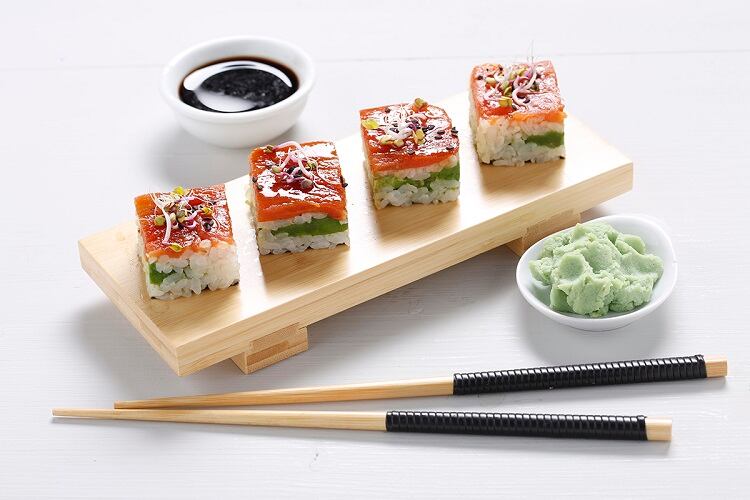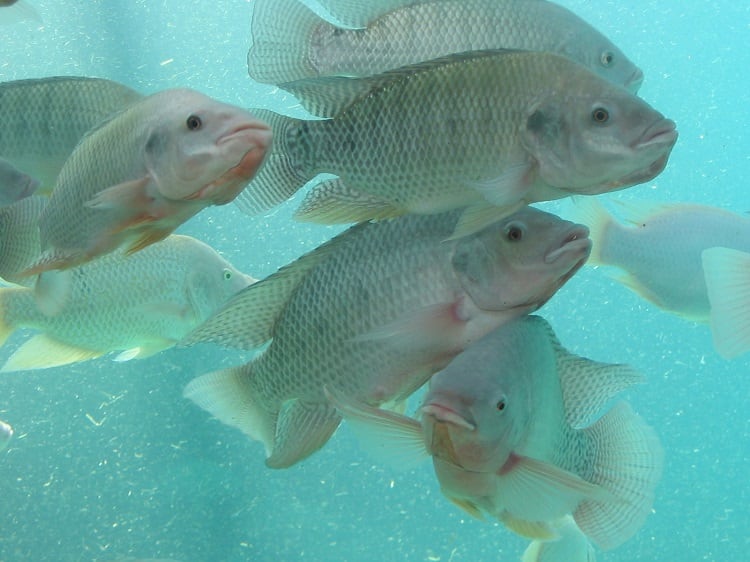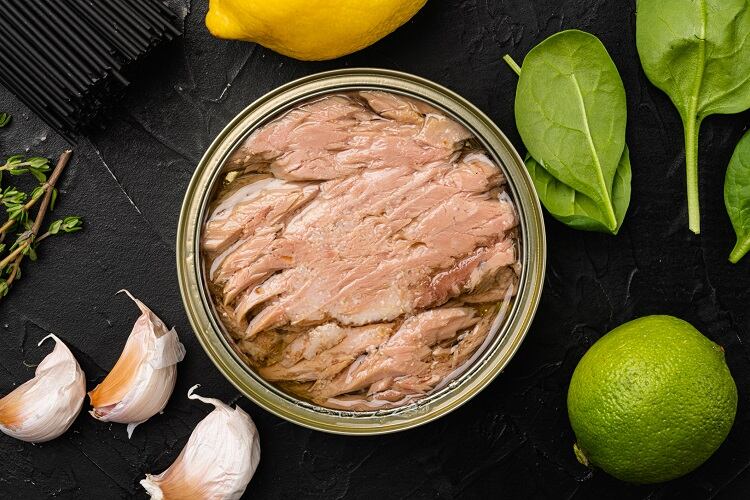The conventional seafood industry has long been criticised for its associations with unsustainable practices.
Bottom trawling, for example, releases greenhouse gases from the ocean floor. This fishing practice, which involves dragging heavy nets along the seabed, is thought to release as much CO2 as the entire aviation industry.
“Bottom trawling and food transportation is exacerbating climate change,” according to entrepreneur Ida Speyer. “And related to that, is the ecological disaster of depleted seafood species.
“Entire species are being wiped out, and when that happens, the balance is thrown off.”
Tuna, for example, is a predatory fish. “If we overfish tuna, we’re removing one of the natural stabilisers of the ecosystem,” Speyer explained. “We’re seeing that many species of tuna are disappearing, with some destined for extinction in the next few years – which will have lasting effects on the ecosystem.”
From a health perspective, consumers should be concerned about the presence of microplastics in fish, the entrepreneur continued. And on a social impact level, the conventional seafood industry is reducing the food supply of vulnerable communities which rely on seafood for sustenance and livelihoods.
Speyer wants to offer consumers an alternative to seafood products that is completely animal-free. Together with co-founder and CTO Silvia Moreno, the duo is transforming well-known, plant-based ingredients into seafood substitutes, starting with tuna.
Known ingredients, and very few of them
Madrid-headquartered Mimic Seafood is developing ‘completely natural’ plant-based products that ‘resemble’ and ‘behave like’ seafood. “We’re basically offering a seamless alternative,” Speyer, the start-up’s CEO, explained.
“If you are a chef in the kitchen and you’re making sushi or poke bowls, you don’t have to have the time or resources required to learn a whole new ingredient. We’ve made something that can be used just like fish.”
Mimic Seafood wants to work with known ingredients, such as tomato, eggplant, olive oil, and seaweed. The start-up is wary of long, unpronounceable ingredients lists in the plant-based sector.
Just five ingredients – tomato, olive oil, algae, soy sauce, and spice blend – are used in Mimic Seafood’s first product.
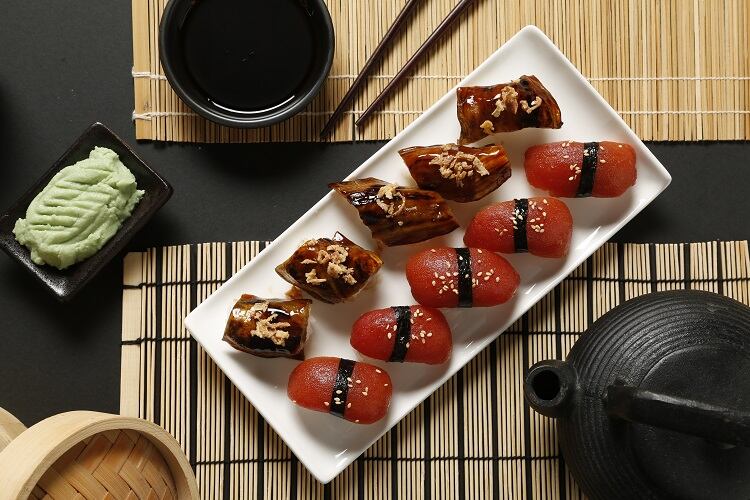
“One of the critiques of plant-based food so far has been that it’s not healthy and the ingredients are hard to pronounce and unfamiliar to consumers… We don’t want consumers to think plant-based food is always artificial with a lot of chemical compositions.
“Health is a key driver for people to eat plant-based, and we want to meet consumer [demand].”
Raw tuna substitute made from tomato
Mimic Seafood has coined its first product ‘Tunato’. The company claims it provides the ‘whole experience of eating raw tuna’, which it has achieved by ‘modifying’ simple ingredients.
“It’s a tomato-based product,” explained the CEO. “Anyone that has ever cooked with tomatoes will know they can be real ‘chameleons’ – they can be sweet or savoury, juicy or hard. They can be like leather if it’s a sundried tomato, or they can be like mush.”
Leveraging the versatility of this salad ingredient, Mimic Seafood has developed technology whereby it removes some of its water content via evaporation. This changes the texture, explained Speyer, as does applying temperature changes.
Different kinds of seaweed provide an ‘ocean flavour’ one would expect from conventional fish. Other ingredients, such as gluten-free soy sauce, add a hint of umami.
“Tunato works perfectly in all applications you would normally find raw tuna,” we were told.
Mimic Seafood is not looking to create a pureplay alternative to conventional tuna, however. “We hesitate to say it’s an alternative to tuna, because we don’t think tuna is the best product out there and we don’t want to benchmark ourselves against it.”
Instead, the start-up is creating an ‘easy association’ for foodservice, restaurants, and consumers to understand: “Wherever you use raw tuna, you could use Tunato instead.”
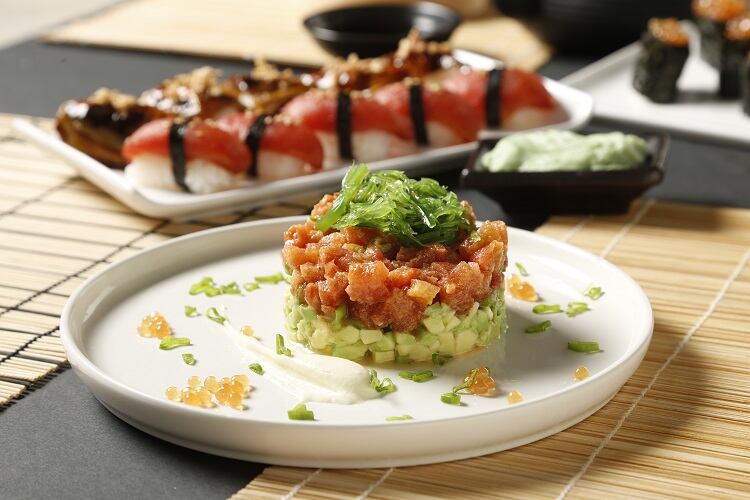
From a nutrition standpoint, the start-up’s products do not mimic seafood’s profile completely.
In protein content, for example, Mimic Seafood’s Tunato product falls short. And intentionally so.
“We are thinking of trying to increase different nutritional aspects of our products, but protein wouldn’t necessarily be one of these. The reason is that no one actually needs more protein. Most people get more than enough.
“Unless you have restricted eating, have health implications, or are a bodybuilder, you’re probably getting more than enough protein already.”
The start-up is interested in boosting its products’ Omega 3 profile, however, via algae. “We just need to figure out a good way to introduce them into our products.
“We’re also working on more products that will have a different kind of nutritional composition, whereby they will be more similar to seafood. But they’re not on the market yet – they will be next year.”
Aubergine-based eel alternative
Tunato is already on the market in Denmark and Spain. The start-up has also started ‘testing the waters’ in the Netherlands.
Its second product, Aubergeel, is expected to enter the market soon. Aubergeel is made from Japanese eggplant, soy sauce, mirin, sake, honey, whole cane sugar, rice vinegar, sesame oil, and corn starch flour.
“Aubergeel is similar in behaviour to marinated eel…it has a sweet, savoury, and strong umami flavour,” explained Speyer.
As a B2B company, Mimic Seafood has its eyes set on foodservice. Retail may well come down the line, but because plant-based seafood remains a relatively new addition to the vegan scene, the start-up would prefer a chef to showcase the products, at least initially.
Pricewise, Mimic Seafood’s Tunato product is selling within the ‘sushi grade tune’ price bracket. However, there may be opportunities to be more competitive in the future as the company scales, we were told.


